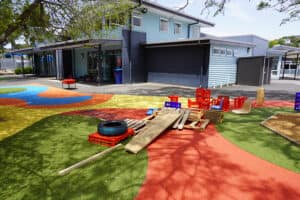In the ECE environment, fixed play equipment is a contentious issue. Often there is not the space for big traditional forts and jungle gym type equipment. Furthermore, these types of equipment often make supervision hard and are inflexible. When only one type of play is offered day after day, children can lose interest.
Flexible play areas, on the other hand, provide changing play environments that keep it stimulating and challenging. This is especially important for facilitating the development of a range of gross and fine motor skills. Today, Centres are trending towards this more flexible approach.
Download the full guide: The Elements of Play
Creo flexible play area options
 Flexible Set Up Area with Moveable Equipment
Flexible Set Up Area with Moveable Equipment
Spaces need to be the right shape to ensure flexible layout options are possible. Safety surfaces are needed under this type of area. Engineered wood fibre, synthetic turf or rubber matting are all suitable.
Loose Parts Play
Loose parts play promotes flexible play and opens possibilities for social and cognitive play, as well as physical skills development. It is self-directed and allows children to take risks.
 Bike Tracks
Bike Tracks
Bike tracks can be added very easily to a site, either through the installation of an artificial safety surface, or by painting the track outline on an available hard surface. This allows road rule learning as well as physical bike skills to develop.
Topography Play
This is a type of fixed equipment that can be used as a flexible play option. A mound, with or without a fixed slide, offers imaginative options as well as motor skills development.
Considerations when selecting flexible play area options
 Space
Space
The size, shape and numbers in your centre will determine the options available.
Location
Main equipment spaces need to be located in such a way as to discourage direct traffic cutting through the space as a thoroughfare route.
Range
The wider the range of experiences the better. A balance of flexible equipment and loose parts is ideal to cover a range of learning and development benefits.
Flexibility
Spaces need to be dynamic, flexible and responsive to maintain the interest, continued growth and learning of the child.
Challenge
Challenge and risk taking is an important element for ECE aged children. However, you need to encourage this in a controlled and safe way.


